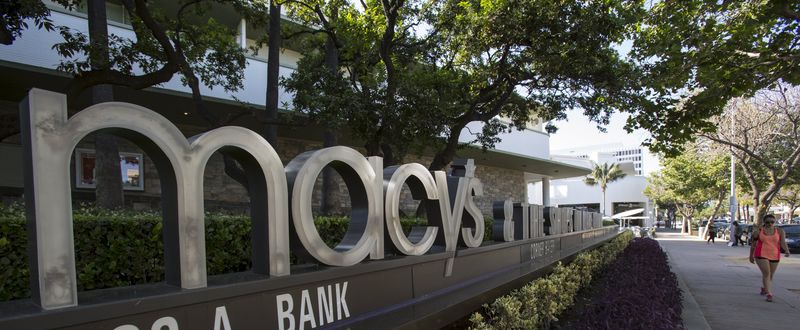Investing.com’s stocks of the week
By Nadia Damouni, Mike Stone and Olivia Oran
NEW YORK (Reuters) - Several hedge funds have asked U.S. department store company Macy's Inc (N:M) to consider options for its real estate, including selling some major sites and then leasing them back, according to several sources close to the matter.
The push is in line with real estate decisions by some other major retailers that have been beneficial to their stock prices.
Hudson's Bay Co (TO:HBC), the parent of Lord and Taylor and Saks Inc, said in February it would form two real estate joint ventures, paving the way for it to sell some of its property assets. Shares of Hudson's Bay have risen almost 50 percent over the last 12 months.
Sears Holdings Corp (O:SHLD) also said in April it plans to spin off 254 stores into a real estate investment trust next month, which it estimates will raise $2.5 billion and alleviate some liquidity concerns. Shares of Sears are up 27 percent since the beginning of the year, providing a much needed boost to a retailer that has lost $7 billion over the last four years.
These moves have emboldened several hedge funds to buy stakes in Macy's in recent months and hold conversations with management about following a similar strategy, the sources said.
Macy's and its financial advisers are listening to the ideas of its shareholders, the sources said.
The company, though, remains more interested in trimming its real estate portfolio at the margins, as it did last year when it sold its Sunnyvale and Cupertino locations in Northern California, they added.
Macy's management believes that pursuing a sale-leaseback strategy in which it would sell its retail space and then rent it back would burden it with significant lease expenses that would erode its profitability and weaken its finances, according to three of the sources.
A Macy's spokesman said in an emailed statement: "We look at all of our stores so we can get the best economic and operational equation in each location. We analyze each store's situation and are always looking to maximize the value of the company."
CROWN JEWELS
Some investors have suggested that Macy's sell its best-known asset, its flagship Herald Square location in New York, to raise cash so that it can pay a higher dividend to shareholders or buy back shares. Hudson's Bay mortgaged the land beneath Saks' 5th Avenue flagship store in Manhattan for $3.7 billion in 2014. The Canadian retail group paid $2.9 billion for all of Saks in 2013.
However, such a move is highly unlikely as Herald Square is one of New York's top tourist attractions and a large part of Macy's identity and brand, the sources said.
Macy's Thanksgiving Day Parade has also appeared in movies from Miracle on 34th Street to TV show Seinfeld. The building was added to the National Register of Historic Places as a National Historic Landmark in 1978.
A number of prominent hedge funds have recently acquired stakes, though it is unclear which have approached Macy's management with real estate proposals.
David Einhorn's Greenlight Capital Inc bought 1.7 million shares in Macy's in the first quarter, although the position is expected to remain passive, a source close to the matter said.
Hedge fund Jana Partners LLC, which often takes activist positions in companies, has also traded in Macy's stock in the past few months, according to people familiar with the matter. Greenlight and Jana declined to comment.
Macy's is no stranger to activist investors shopping for hidden value. Carl Icahn took a large position in Macy's then parent company Federated Department Stores Inc in 2006. Icahn pushed for the company to unlock its real estate value, but ended up exiting the stock several months later.
During Macy's first quarter earnings call on May 13, Chief Financial Officer Karen Hoguet addressed the company's real estate strategy, suggesting that some estimates valuing its assets have been done "over simplistically." According to its last annual report, Macy's property has a book value of $7.8 billion. Macy's owns 447 of its 823 stores as well as several offices.
"We are studying closely with our key banking partners all the various transactions that have happened lately and all the possible strategies, the pros, the cons of how you would do it, etc., etc., to see what is right for us," Hoguet said on the call.
Shares of Macy's, which have risen around 11 percent over the last 12 months, are slightly below the broader S&P Retail index over the same period. The company boosted its dividend by 15 percent to 36 cents during the first quarter of 2015 which is the fifth dividend increase in the past four years. During the quarter, Macy's also increased its share repurchase program by $1.5 billion.
In the past seven years, shares of Macy's have risen 280 percent under long term CEO Terry Lundgren's watch. Both Lundgren and the Macy's board, which includes former Hilton CEO Stephen Bollenbach, are highly regarded in the retail industry, the sources said.
Meanwhile, other activists that have sought to effect major structural change within large retailers have been thwarted or suffered losses. Pershing Square Management's Bill Ackman failed to convince Target Corp (N:TGT) to shed its stores into a real estate investment. Ackman also stepped off the J.C. Penney (N:JCP) board in 2013 after an unsuccessful two-year attempt to remake the department store into an upscale retail chain.
